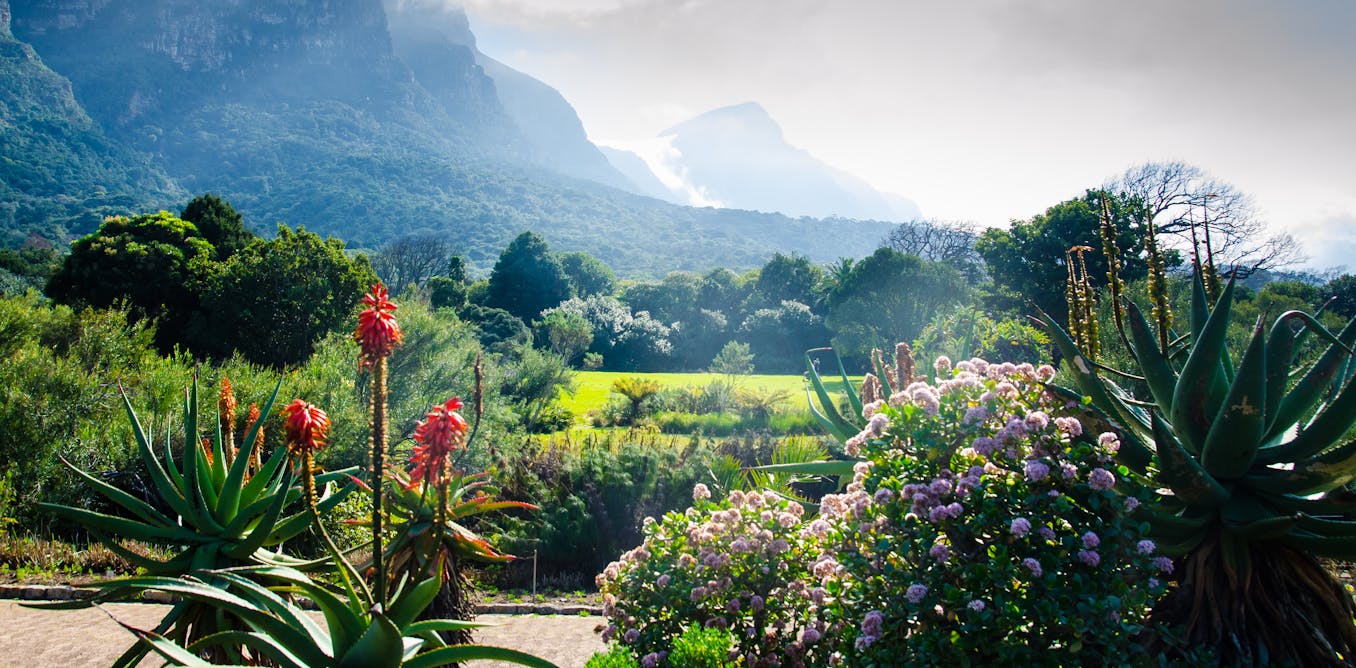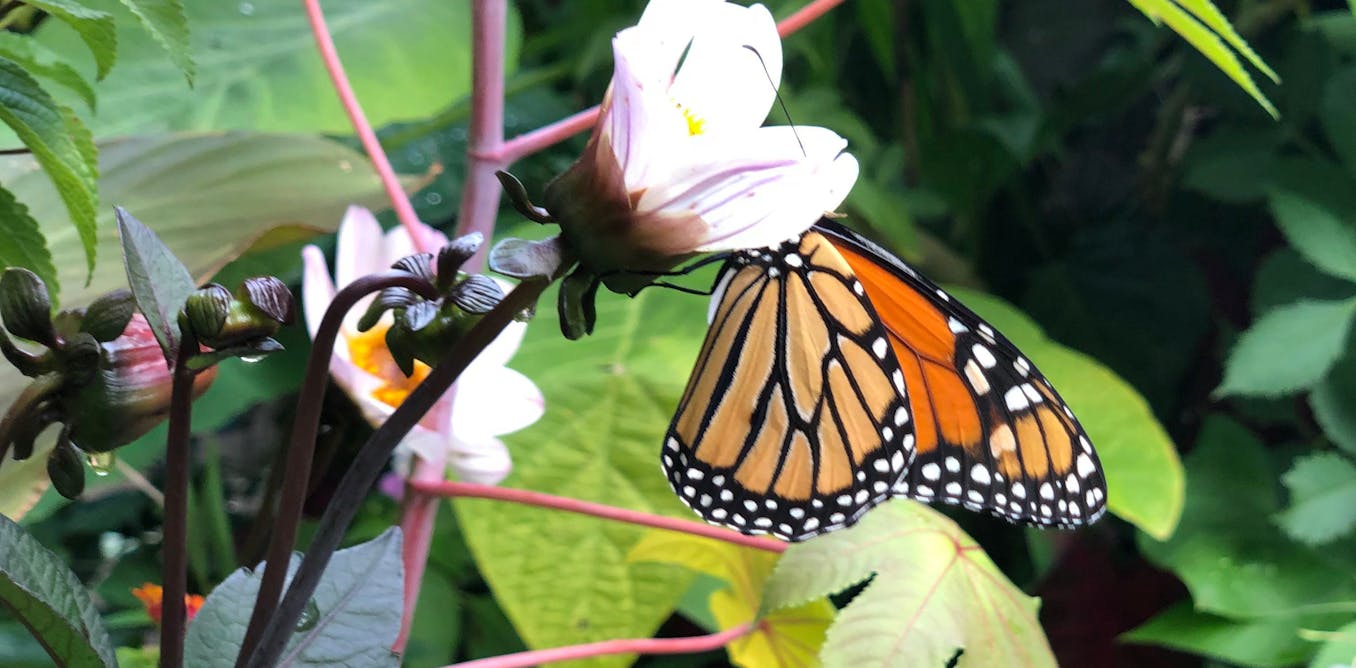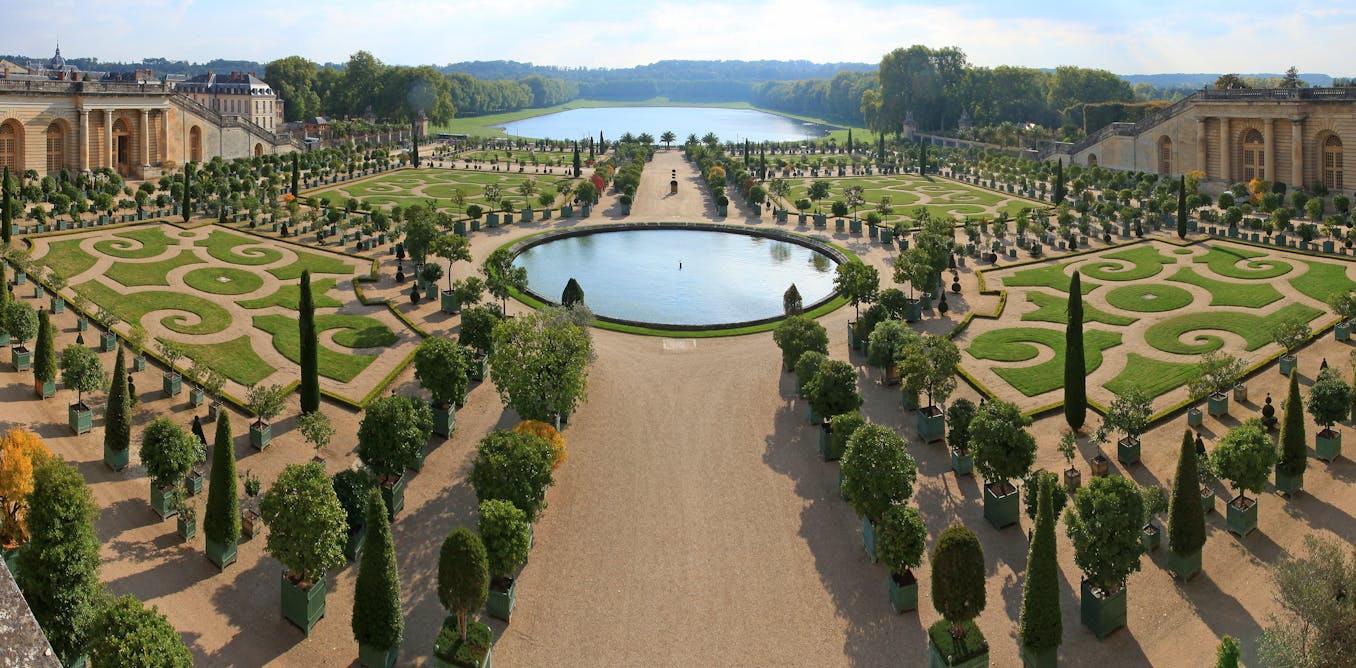
the standard roots of your yard yard
You don’t must be an avid gardener or know the entire Latin names of vegetation to grasp the prospect for reflection {{that a}} stroll inside the yard can afford us. The explosion of colours, shapes, and textures inside the yard, the tenacity and ingenuity of the vegetation, so determined to claim their correct to life and marvel, can droop for us the troubling sides of frequently life.
Nevertheless gardens are moreover certain to their political and spiritual historic previous, traces of which could possibly be current in our ongoing cultural obsession with them. The connection between the well-known gardens of Versailles, as quickly because the coveted possession of Louis XIV, and our humble once more yard is deeper than we might take into consideration.
Study additional:
Friday essay: what’s it about Versailles?
Throughout the e book of Genesis, our creation begins in Eden, the “yard of God” which our ancestors, Adam and Eve, failed to grasp. Having misplaced our privileged entry to this divine yard resulting from their sin, we perpetually try to re-create it – in our homes, in our cities, in our heads. The earthly yard as a reflection of the paradise we’re in a position to hope to experience after lack of life can be a central motif inside the Qur’an, a promise delivered by Allah himself.
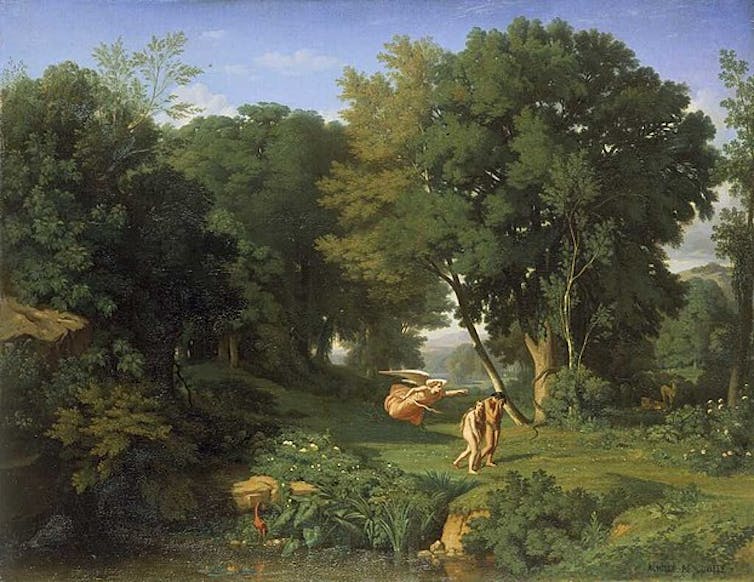
Adam and Eve Chased out of the Terrestrial Paradise. Jean Achille Benouville, 1841.
Gods and kings
Throughout the historic Near East, in whose fertile soil the Biblical traditions took kind, kings (who normally assumed priestly duties) had been believed to have the monopoly of talking with the gods inside the royal yard. This was seen as a microcosm of the divine yard.
Throughout the Babylonian Epic of Gilgamesh (from spherical 2000 BCE), the hero-king Gilgamesh travels to the wondrous yard of the sun-god, the place flowers boast priceless gems as a substitute of leaves, in a quest to claim immortality. Although immortality eludes Gilgamesh, the divine yard offers him data. Thus outfitted, he returns to his metropolis, Uruk, additionally referred to as “the yard of Gilgamesh,” and builds magnificent partitions which is ready to etch his establish into the memory of mankind.
Study additional:
Info to the classics: the Epic of Gilgamesh
In a single different story, no matter his uneasy relationship with the fertility goddess Inanna, whose advances he in the end rejects, Gilgamesh poses as her devoted gardener. He carves a throne and a mattress for Inanna from the Huluppu tree whereas she makes him a magical drum and drumstick from it to summon warriors to battle. When Inanna’s favourite tree is threatened by a serpent nesting at its roots, solely Gilgamesh and his companions rush to her help.
All by means of the Near East, the yard was a spot the place gods confirmed the legitimacy of kings. Sargon I (1920-1881 BCE), the founding father of the Akkadian-Sumerian empire, poses inside the epic The Legend of Sargon as a humble gardener, and was hand-picked by the goddess to develop to be the king.
Historic Near Jap kings invested exorbitant sums of money in developing magnificent royal gardens, architectural marvels which crystallised in of us’s minds their distinctive communion with the gods. Sennacherib (704-681 BCE) doable commissioned the well-known hanging gardens to be constructed near his capital Nineveh, although we nonetheless typically examine with them as a result of the Hanging Gardens of Babylon.
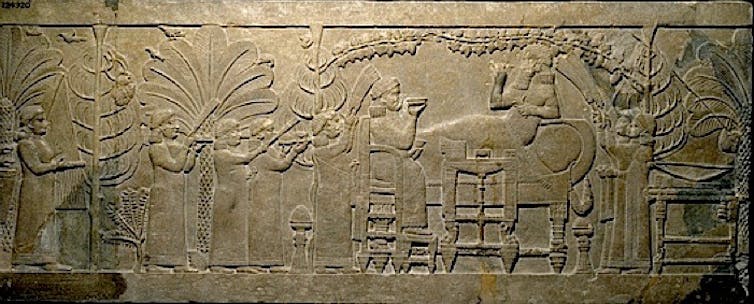
British Museum
The notion was moreover recognized to the Israelite king Solomon (circa 970-931 BCE), who proudly launched his constructing of lavish, well-irrigated gardens and groves, and was also used by the Achaemenids (a Persian dynasty). Definitely the Persian phrase for an enclosed yard, pairi-daêza, was launched into Greek as paradeisos (“paradise”) by the historian Xenophon.
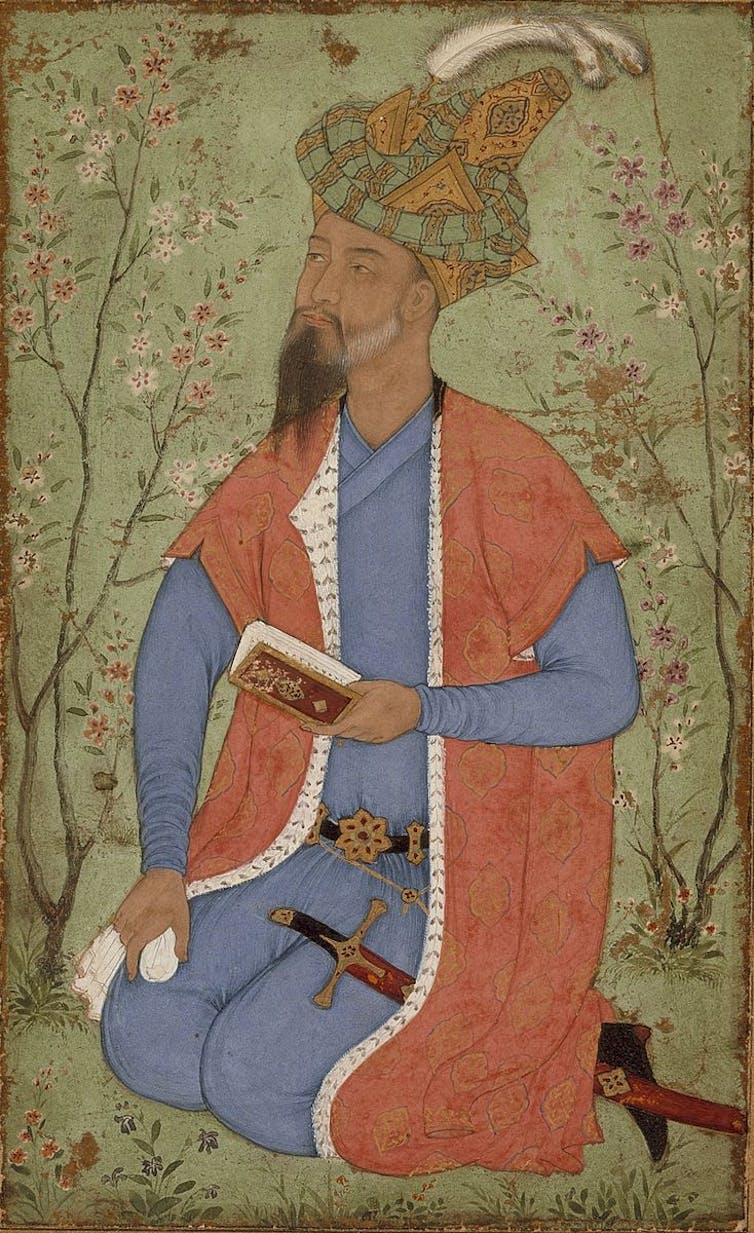
Wikimedia
In his biography of Cyrus the Good, the founding father of the Achaemenid Empire, the Xenophon notes with admiration the king’s impeccable gardening experience which matched his royal benefit. Seleucus I, Alexander the Good’s primary who obtained right here to rule Babylon, moreover embraced the profile of the king as gardener. His well-known yard at Daphne, open air Antioch, renowned for its abundance of shady laurel timber, tall cypresses, and perennial fountains, was fastidiously associated to the muse of the Seleucid dynasty and Apollo, their divine patron. Throughout the east the customized certainly not misplaced its attraction.
From the Middle East to the world
The Romans, who inherited the kingdoms of Alexander’s successors, adopted the ideology of gardens with renewed zeal, transplanting it in Europe. The Roman Empire withered, nonetheless generations of aspiring aristocrats and rulers, along with Charlemagne, Rely Robert II of Artois (1250-1302), Cosimo de’ Medici (1389-1464), and Henri II (1519-1559) certainly not forgot the sense of grandeur and superhuman aura that distinctive, distinctive gardens could afford them.
Relationship from the Middle Ages, the Vatican Gardens, owned by the Pope, proceed to evoke the political and spiritual dimensions of the yard, which had been significantly celebrated in Britain with the ascension of Henry VIII in 1509. European colonization of the Middle East seen the idea of the yard reintroduced inside the places of its origin, nonetheless, moreover imported inside the New World. Gardens such as a result of the Victoria gardens in Mumbai confirmed off the legitimacy of British rule.
Study additional:
The science is in: gardening is sweet for you
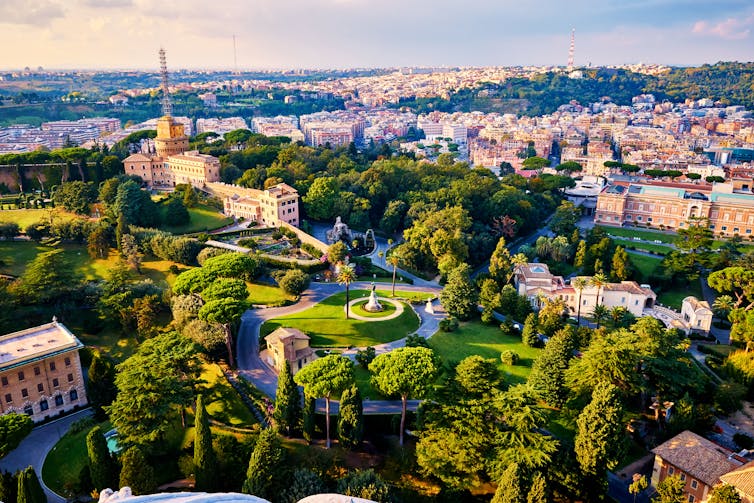
Shutterstock
The connection of the yard with politics stays strong. Neighborhood gardens are stable as an epitome of democratic values, and the Royal Gardens in all fundamental Australian cities advocate inclusiveness, no matter their monarchical titles. Gardens surrounded historic temples to ship worshippers nearer to god; gardens embody battle memorials inviting us to reflect on life misplaced and life gained.
So subsequent time you’re wandering spherical your private yard, mirror on the reality that you just’re strolling inside the footsteps of the kings and queens of yesteryear, in your private slice of paradise.
